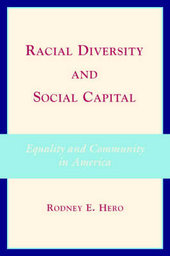
|
Racial Diversity and Social Capital: Equality and Community in America
Paperback / softback
Main Details
| Title |
Racial Diversity and Social Capital: Equality and Community in America
|
| Authors and Contributors |
By (author) Rodney E. Hero
|
| Physical Properties |
| Format:Paperback / softback | | Pages:220 | | Dimensions(mm): Height 229,Width 152 |
|
| ISBN/Barcode |
9780521698610
|
| Classifications | Dewey:305.800973 |
|---|
| Audience | | Professional & Vocational | | Tertiary Education (US: College) | |
|---|
| Illustrations |
14 Tables, unspecified
|
|
Publishing Details |
| Publisher |
Cambridge University Press
|
| Imprint |
Cambridge University Press
|
| Publication Date |
26 March 2007 |
| Publication Country |
United Kingdom
|
Description
Race and racial diversity are important aspects of America and have been shown to substantially affect social relations and the political system, often in ways inconsistent with the values of equality. However, greater civic association and a general sense of community, embodied in the concept of social capital, are said to have tremendous beneficial effects and profoundly influence American society. This 2007 study juxtaposes and critically assesses two bodies of research that have reached different conclusions on these issues. Is America's legacy of racial inequality an 'evil twin' of the benefits of social capital? By analysing the social outcomes for racial minorities, in addition to other dimensions of American politics, the author shows that the impact of racial diversity consistently outweighs that of social capital.
Author Biography
Rodney E. Hero is the Packey J. Dee III Professor of American Democracy in the Department of Political Science at the University of Notre Dame. He is the author of Latinos and the U.S. Political System (1992), which received the Ralph J. Bunche award of the American Political Science Association, and Faces of Inequality (1998), winner of the APSA's Woodrow Wilson Foundation Award. Professor Hero is also co-author of Multi-Ethnic Moments: The Politics of Urban Education Reform (2006).
Reviews"Focusing on fundamental questions that concern participation, public policy, and vectors of inequality, this thoughtful book enlarges our understanding of how race deeply constitutes many features of American politics and society. In so doing, it powerfully demonstrates the costs to empirical and normative theory when such matters are downplayed or underestimated, and the gains to understanding and possibility when they are brought from the periphery to the center of political analysis." Ira Katznelson, Ruggles Professor of Political Science and History, Columbia University, author of When Affirmative Action Was White: An Untold History of Racial Inequality in Twentieth-Century America (2005). "Rodney Hero has done it again! With characteristic polish and aplomb, Hero moves the debate over racial diversity and social capital from Sturm und Drang to carefully considered, empirically testable propositions. Social capital, it turns out, is neither a Trojan horse nor a panacea for the deep divisions that characterize pluralistic societies. In many contexts, it works more toward the maintenance of white privilege than it does as a collective good, aiming toward the betterment of a community dans l'ensemble. This is a splendid, signal contribution." Taeku Lee, Department of Political Science, University of California, Berkeley "This is a long-awaited and important book...Coming from a distinguished scholar, Rodney E. Hero, it provides an invaluable contribution to the current culture versus structure debate, and its contents are relevant beyond the American context." Paul M. Kellstedt, Journal of Politics
|